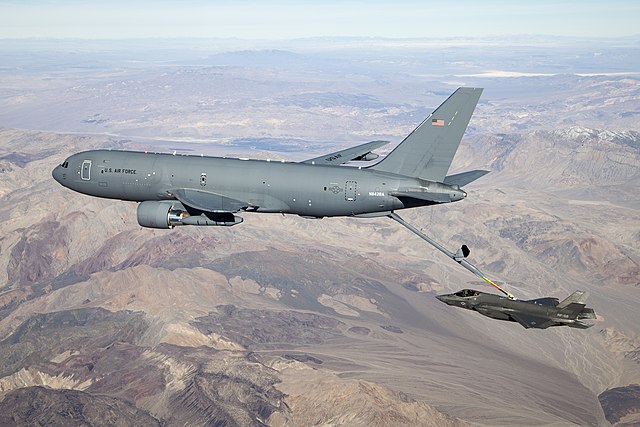JINSA CEO: Expediting Aircraft Delivery to Israel will Send Signal to Tehran
By Omri Nahmias
WASHINGTON – The US administration is missing an opportunity to gain leverage in their talks with the Iranians that would enhance the US’ position by not expediting Israel’s KC-46 tanker order, says Michael Makovsky, president and CEO of the Jewish Institute for National Security of America (JINSA).
He said that the estimated supply time for the planes is four years. “Even if the administration didn’t want the Israelis to attack Iranian nuclear facilities, it would actually be advantageous for the administration’s position to at least signal that they’re going to expedite delivery because I think it could only enhance their leverage,” said Makovsky.
It was reported on Monday that the US has rejected an Israeli request to fast-track the delivery of two tanker aircraft that had been ordered by Israel, as plans for a possible military option against Iran’s nuclear plan move forward. According to the Ynet report, the IDF hopes to convince the US over the next year.
Makovsky said that the estimated supply time for the planes is four years. “So, what Israel has been asking for is expediting – effectively jumping to the head of the line so that they get at least two planes off the line instead of the US Air Force.”
So far, the Pentagon has refused.
Makovsky says that there could be two reasons for the refusal: “The most obvious is that the Air Force wants the US Air Force to have it first without anyone jumping the line. The second possibility, and it’s only a suspicion, is the administration doesn’t want to let them jump the line because it could be used for a military attack on Iran.”
He said that he believed that the US should be adding to the pressure.
“They should be actually trying to raise the specter of a credible military option, whether an American military option or an Israeli military option, that would only enhance, I believe, the US negotiating position,” said Makovsky. “But that’s not how this administration looks at it. They have sort of reduced their leverage. They have been trying to convince the Iranians that their intentions are good: they haven’t enforced sanctions, and they don’t speak out about the Iranian human rights violation. Very importantly, they are not retaliating against any Iranian-backed strike against US forces in Syria in October. They have tried to minimize friction with Iran. They think that helps them get a deal. I think it’s the complete opposite.”
Makovsky suggested that Congress should weigh in as well.
“I think that the Iran nuclear talks have been like a slow-moving Afghanistan,” he said. “Kabul fell pretty quickly in August […] Besides the withdrawal from Afghanistan, getting Iran back into the JCPOA has been one of the administration’s main objectives, and it’s been a disaster so far. So I think that folks in Congress – Democrats and Republicans – need to engage this issue.
“If you think there could be a possible tolerable deal worked out with the Iranians in Vienna, then you would want to increase leverage because the administration’s approach for the whole year hasn’t gotten them anywhere. And if you think that ultimately there’s going to be a major conflict between Israel and Iran over its nuclear facilities, I think it’s incumbent upon the United States to give Israel the tool it needs to defend itself by itself. And I think folks in Congress and other folks who care about America’s position in the region and care about Israel and about our other regional allies need to engage this issue and try to pressure the administration.”
Originally published in Jerusalem Post

